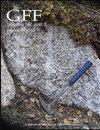Shell injuries, repair and malformation in the early Cambrian mollusc Helcionella antiqua from Scania, Sweden
IF 1.2
4区 地球科学
Q2 GEOLOGY
引用次数: 0
Abstract
ABSTRACT Three cases of repaired injuries and malformation in specimens of the helcionelloid mollusc Helcionella antiqua (Kiær, 1917) from the lower Cambrian (Cambrian Series 2, Stage 4) Gislöv Formation of southern Sweden document some of the oldest known durophagous attacks on Palaeozoic molluscs. Two of the injuries are developed as clefts, of which one had a severe effect on the continued growth of the shell. The third example is a large embayment removing large portions of the supra-apical part of the shell. A similar repaired injury is known in the slightly older mollusc Marocella mira Geyer, 1986. from Antarctica and Australia. The morphology of the injuries and the hydrodynamically quiet depositional setting suggests that the shell damage was caused by failed predatory attacks. The location of the repaired injuries suggests that the attacks may have targeted the head region of the molluscs, thus supporting an endogastrically coiled orientation of the shell in Helcionella. Only three repaired injuries in 252 Helcionella specimens were found, giving a shell repair frequency of 1.2%. All three examples occur in the larger size classes. The size-frequency distribution (N = 182) is strongly right skewed, which could suggest high input of juvenile specimens into the assemblage. The assemblage is interpreted as a time averaged and mixed death assemblage, albeit with good correspondence with the living shelly assemblage, due to a relatively thin, homogenous unit that may suggest within-habitat time averaging.瑞典斯堪尼亚早寒武纪软体动物古Helcionella的壳损伤、修复和畸形
本文章由计算机程序翻译,如有差异,请以英文原文为准。
求助全文
约1分钟内获得全文
求助全文
来源期刊

Gff
地学-地质学
CiteScore
2.80
自引率
10.00%
发文量
11
审稿时长
>12 weeks
期刊介绍:
GFF is the journal of the Geological Society of Sweden. It is an international scientific journal that publishes papers in English covering the whole field of geology and palaeontology, i.e. petrology, mineralogy, stratigraphy, systematic palaeontology, palaeogeography, historical geology and Quaternary geology. Systematic descriptions of fossils, minerals and rocks are an important part of GFF''s publishing record. Papers on regional or local geology should deal with Balto-Scandian or Northern European geology, or with geologically related areas. Papers on geophysics, geochemistry, biogeochemistry, climatology and hydrology should have a geological context. Descriptions of new methods (analytical, instrumental or numerical), should be relevant to the broad scope of the journal. Review articles are welcome, and may be solicited occasionally. Thematic issues are also possible.
 求助内容:
求助内容: 应助结果提醒方式:
应助结果提醒方式:


